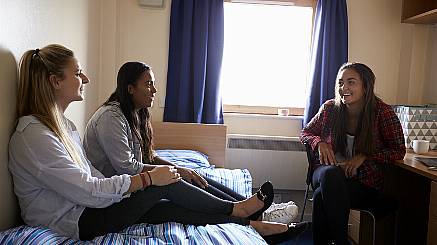A Guide To What Your Landlord Needs To Provide In Your Student Accommodation

There's no doubt students have it tough when it comes to finding accommodation, especially with rents soaring in recent years. It's a relief and exciting too, when you do eventually find somewhere to stay, especially if it's your first move from home.
It's likely in getting so caught up in the big move, you forget to check out a few bits before you hand over your deposit. Fire safety is a biggie. Fear not though, we've come up with a list of essential things your landlord needs to provide in your student digs.
1. Smoke alarms:
Houses should have a suitable fire detection and alarm system. Test your alarms on a regular basis, NEVER borrow batteries from smoke alarms and ALWAYS ensure to replace batteries as soon as you hear the beep as opposed to the shrill alarm indicating fire – make sure you can tell the difference! (Unsure - press the test button to see)
2. A fire blanket:
An absolute necessity, this should be suitably located in the kitchen near your cooker or hob – but not on the wall behind it.
3. On multi-unit buildings:
Landlords are legally required to provide a mains-wired smoke alarm, a fire blanket AND an emergency evacuation plan. Common areas should also have suitable fire detection and alarm systems, and emergency lighting.
4. Furniture and furnishings:
So you've found a house that is perfect for you and sure the furniture is lovely altogether! Chances are, the question of its fire resistance doesn't spring to mind. But if landlords are providing furniture and furnishings, they should be fire resistant and compliant with fire safety standards.
5. Electric appliances:
Landlords are legally obliged to ensure all electrical appliances provided or fitted by the landlord are safe to use and free from danger. Don't use the socket that looks dodgy, even if you are dying for your cup of tea.
On electricity and gas, installations should be maintained in good repair and safe working order.
6. Fire Extinguisher:
Although not a legal requirement, they are recommended - for dealing with small fires only!
7. To avoid the outbreak of fire:
Smokers listen up! If you do smoke at home, never smoke in the bedroom. If you're feeling tired and/or you've had a few drinks, don't have a smoke.
An open fire at home? Don’t have mirrors over the fireplace – while standing in front of an open fire gazing into the mirror you run the risk of your clothes catching fire! And make sure you don't leave anything that can burn near a fire, like magazines, clothes or papers.
Be careful with the likes of electrical items. Don’t overload sockets, run electric cables across cookers, heaters or fires, and never leave your phone charger or other electrical appliances plugged in overnight. If you are using heaters, do not use them to dry clothes and make sure the area around them is kept clear of items that could catch fire.
Candles can be romantic and add atmosphere to a room but use them carefully. Avoid using tea lights, always use a safe candle holder safely placed away from curtains and soft furnishings and never leave candles burning where you cannot keep an eye on them.
What to do in the case of a fire
While it's hugely important to take every step possible to fend off the possibility of a fire, it's just as important to know what to do if one does break out. If there is a fire call 999/112, Get Out, Get the Fire Brigade Out, Stay Out.
For more info on what your landlord should provide, click here. If you are concerned about faulty electrical fittings, appliances, provision of fire alarms, equipment or evacuation plans, you should contact your landlord immediately.